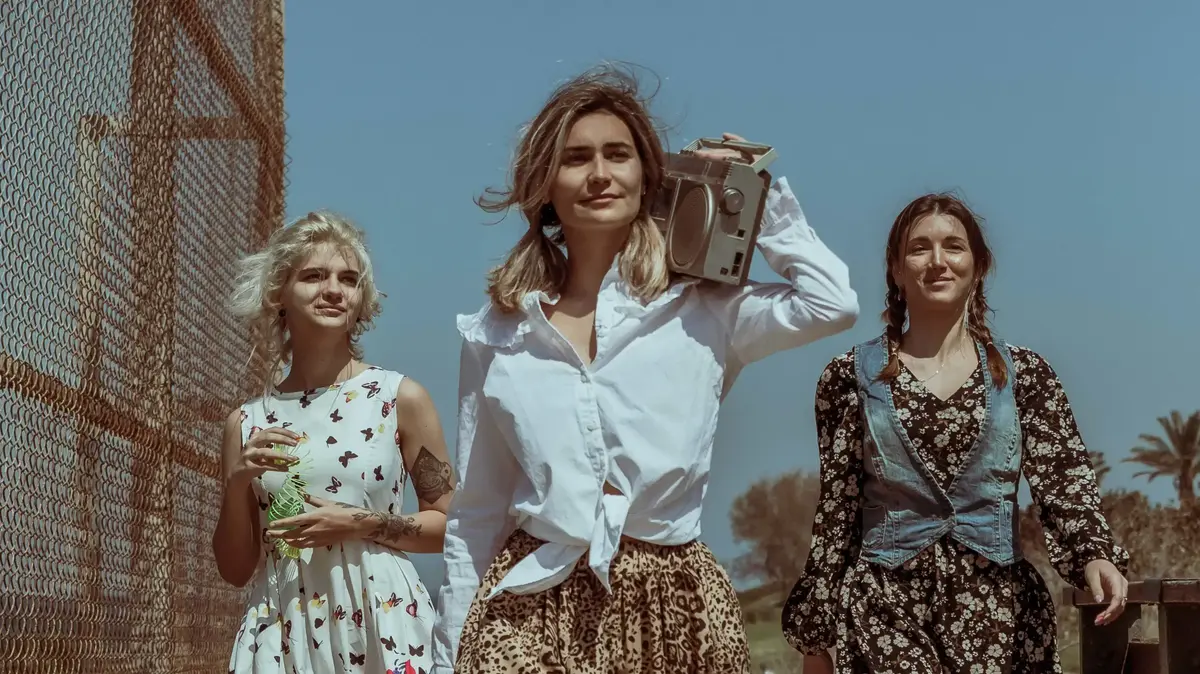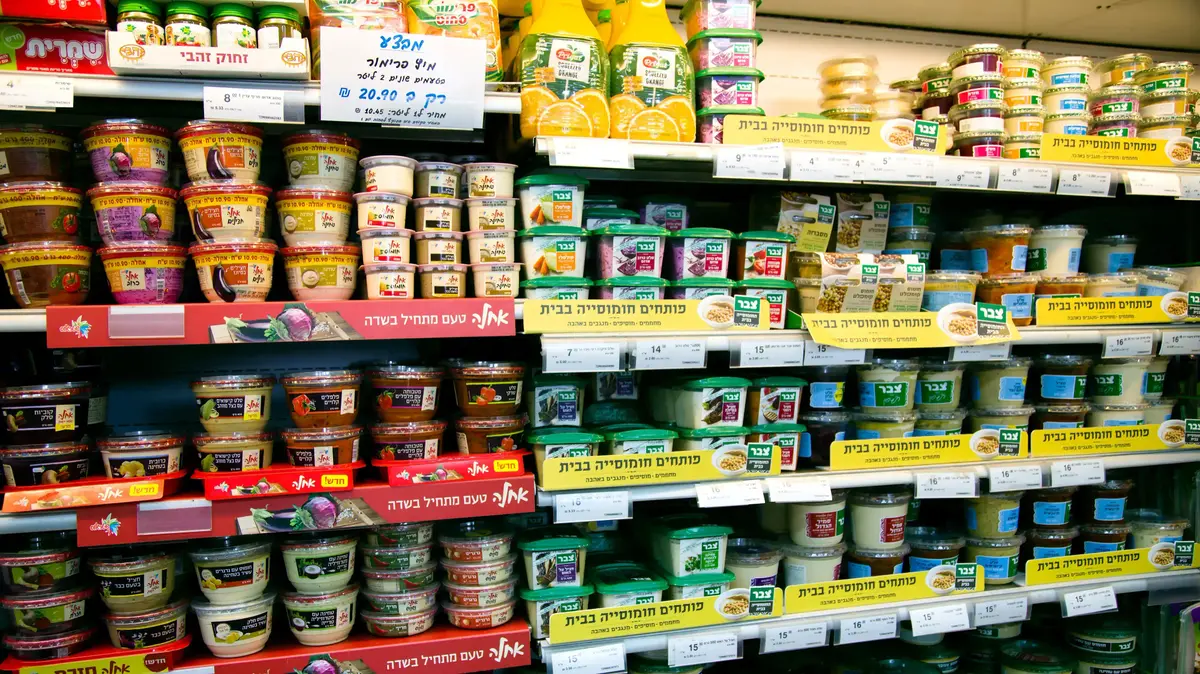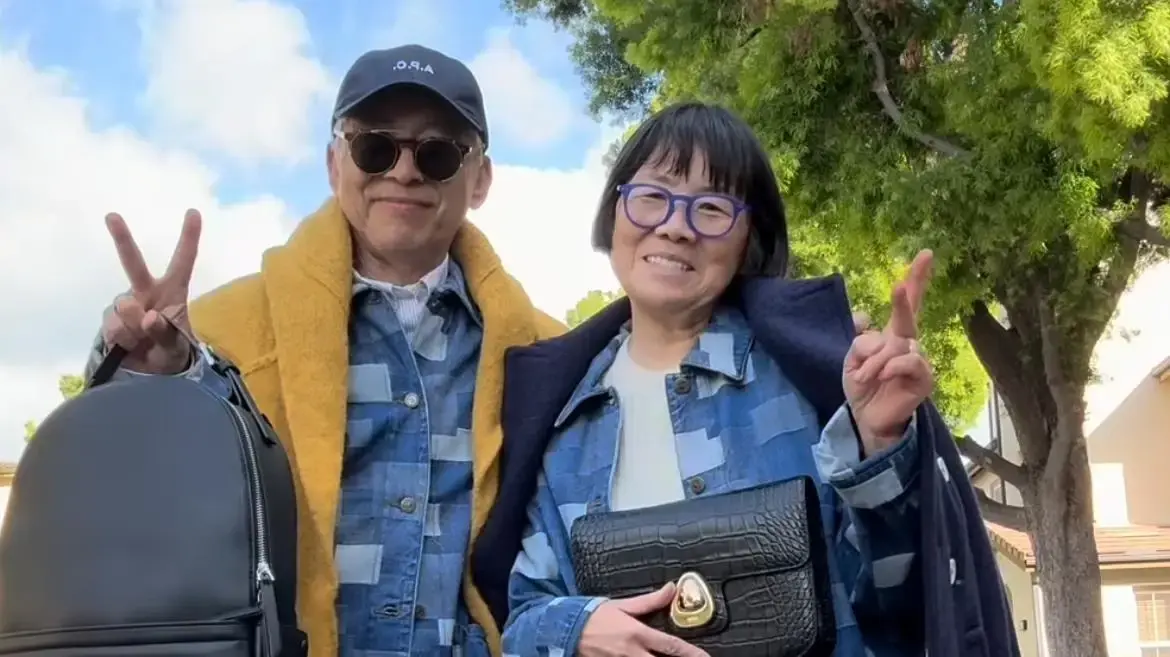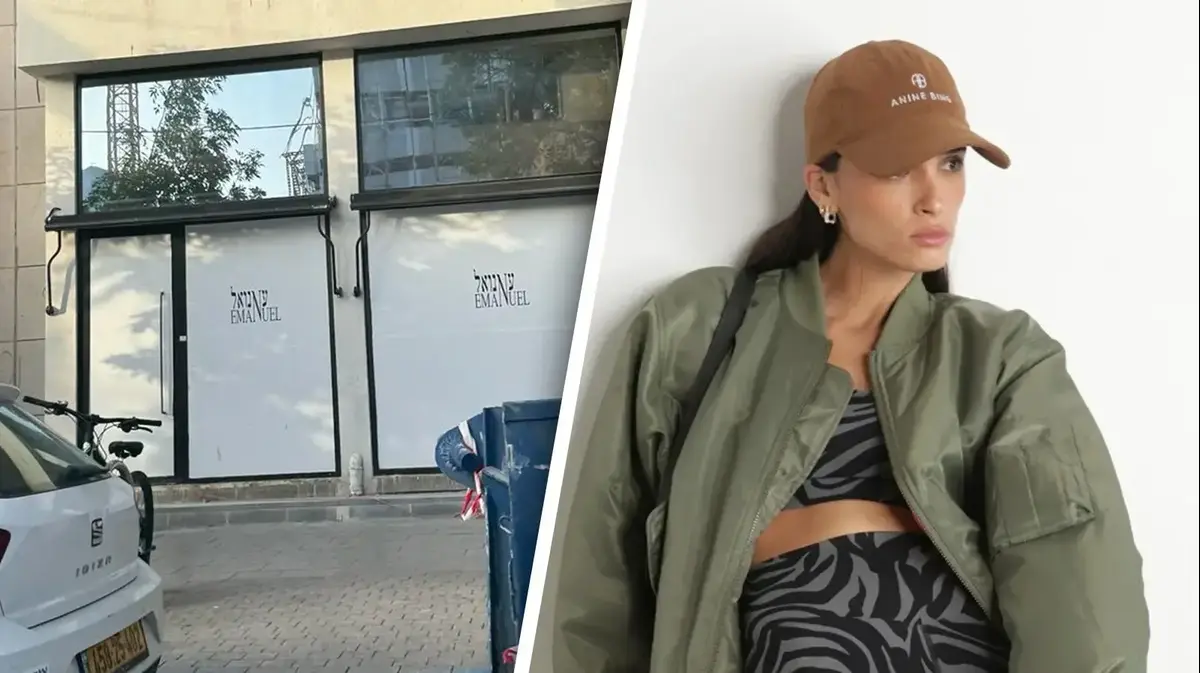We found another solution to the rising cost of living: 7 chains and second-hand stores that are very worth getting to know
The International Second Hand Clothing Day that took place today (25.8) is an excellent opportunity to shine a spotlight on 7 local chains and stores that are most worth getting to know, that offer accessible and high-quality clothing and in addition - protect the environment and the pocket
Tali Arbel
25/08/2022
Thursday, August 25, 2022, 09:51 Updated: 10:47
Share on Facebook
Share on WhatsApp
Share on Twitter
Share by email
Share in general
Comments
Comments
On August 25 (the very day!) go to your favorite thrift store and renew yourself.
Photo from the fashion campaign of the "Dandsha" chain (Photo: Kseny Kolesnik)
"The fashion industry is one of the most polluting and exploitative industries in the world", we all already know how to recite it.
But what does each and every one of us really do to consider the environment and understand the enormous impact we all have, together and separately, on the planet?
Well, not enough.
How many times have you bought an item only to wear it once or twice and throw it away after years of gathering dust in the dark back of your closet?
The answer: too much.
Fortunately for the fan, the "International Second Hand Clothing Day" movement is here to remind us that buying second hand items and donating our used clothes creates a positive cycle that is essential to reducing the waste we produce.
What's more, incorporating second-hand clothes into your wardrobe only raises the level of unique style, positions you as someone who understands what's happening around you, and even allows you to enjoy a clear conscience by contributing to the culture of fashion recycling.
So on August 25 (the very day!) go to your favorite thrift store and renew, that is, recycle.
There is no more updated and advanced style than reusing quality clothes.
Photo courtesy of Come Il Po (Photo: Rupina Feldman)
But why should we wear used clothes?
For several years now, second-hand and vintage clothes have been a leading trend (which provides a great contrast to fast fashion).
This is a consequence of the increased awareness of the importance of preserving the planet, a growing interest in ecology that has placed the culture of reduction and consideration for the environment at the forefront, and the realization that it is possible to dress well, even very well, while incorporating items from the reuse genre.
International Second Hand Clothes Day aims to increase awareness of the importance of recycling clothes, and help save us from our wasteful selves.
On this day it's all about breaking the stigma around second hand clothes and choosing to switch to sustainable fashion.
And between us?
There is no more up-to-date and advanced style than reusing high-quality clothes while on the way reducing, if only slightly, the consumption of fast fashion that we have become addicted to.
More in Walla!
"The goal is to feel like we are inside a football stadium"
In collaboration with LG
Extravagance out, no calculated purchase!
Photo from the fashion campaign of the Chelsea chain (photo: courtesy of Chelsea)
The poet does not intend to wear ragged or obviously unhygienic clothes.
Rather, mobilization for sustainable consumption and fashion, which is also in style.
Buying clothes that have been worn before, from reputable and good sources, has so many advantages.
The first and most obvious of all is saving: in the current cost of living conditions that occupy us all, extravagance is out and a calculated purchase is a no!
Therefore, this is a golden opportunity to find clothes in excellent condition, sometimes even designer clothes, at a fraction of their retail price.
The second benefit, and perhaps the most important, is to preserve the earth's resources, reduce pollution and practice a little sustainable lifestyle. What's up?!
Another advantage, over time you will adapt to yourself a unique style and stop following the trend of the herd.
You may have to dig deep, but there are countless stories of people finding designer clothes with historical value in thrift stores.
The fast fashion industry has a dramatic impact on the environment.
Photo from the launch of the Ha-Mazeyon store in Tel Aviv (Photo: Or Gefen)
The polluting facts
In a reality where tons of clothes are thrown into landfills and the sea in a frequent and polluting manner, just because a certain style is no longer "known" or too large quantities are produced, it would not be an exaggeration to declare that the fast fashion industry has a dramatic impact on the environment, and not in a good way.
The trends that change overnight, the threshold of excitement and demand that have become so high, and the pressure to reduce the cost and the time it takes to get a designed item - all of these lead to the fact that the environmental angle in most cases is not taken into account at all.
Whether it is in water pollution and the use of toxic chemicals in the production processes, or in increasing the levels of textile and plastic waste that is buried in the ground, burned, or reaches the sea every year.
And that's even before we talked about the social harm and exploitation (mainly of women and children) under the auspices of harsh working conditions in sweatshops around the world, especially in third world countries, which unfortunately also claim lives.
To protect the environment we all need to reduce the use of different energies, consume less and recycle as much as possible.
It may sound like a drop in the (polluted) ocean, but every mobilization is important, big or small, and one of the ways to reduce the use of resources and save money is: wear second-hand clothes and cut back on buying new clothes, or at least combine the two.
One of the ways to reduce the use of resources and save money is to wear second-hand clothes and reduce buying new clothes.
Photo courtesy of Story Network (Photo: Adi Gilad)
And we will move on to the recommendations
Second-hand fashion is an environment-conscious alternative that is also full of chic, allowing us to be precise in our choices and to experiment with putting together exclusive looks that you probably won't see on the hangers in the fast chains, on the feed or on the street.
This time we chose to put the focus not on vintage super brands, but on accessible second-hand fashion.
So if you too are burning to experiment with the sustaining genre - we have compiled for you 7 chains and stores, nationwide and online, that are the most worth starting with:
1. The Discovery Network in collaboration with the Shekel Association - community integration for people with disabilities
"The store will provide employment and lead the trend of green consumption in Tel Aviv."
Avi Avikar, one of the owners of the HaMasyon network (Photo: Or Gefen)
HaMasyon is one of the largest chain of second-hand stores in Israel that has been operating since 2013 as a social business that encourages sustainability and recycling, in cooperation with the Shekel Association. In the chain's huge stores you can find housewares, shoes, accessories, books, toys, children's, men's and women's clothing, vintage and even brands About
40% of the network's employees are disabled employees who are integrated in various positions and accompanied by the Shekel association.
Recently, the chain launched the flagship store in Dizingoff Center, with the launch celebrations ending with a fashion show of the Amal Max Payne campus fashion trend, in which all the models were sewn by the students of the trend from recycled jeans and textile scraps.
Avi Avikar, one of the owners of the Hazayon chain: "It is a great excitement to come to the heart of Tel Aviv with a social business that not only contributes to the community but also promotes green and sustainable consumerism. The store will provide employment for approximately 20 employees, 12 of whom will be disabled.
Price range: most items range from NIS 19.90 to NIS 49.90.
You can also find items from 9.90 shekels to several hundred shekels for the luxury brands.
Where:
The chain has 5 branches - Dizengoff Center, Ramat Gan, Ma'ale Adumim and two branches in Jerusalem.
to the find site
2. Chelsea - the most technological second-hand chain around that also allows you to make money
"Enjoy all the good second hand and also make money".
Michal Sonsino Ganor, owner of the Chelsea chain (photo: courtesy of Chelsea)
Chelsea is a chain of second-hand fashion stores that offers a large selection of clothes alongside accessories and shoes, which creates a unique retail experience and also leads a view of sustainability and social-environmental awareness, one that allows people to save money when purchasing fashion.
Chelsea succeeds in making the second-hand world accessible in a unique way with the help of spacious stores designed as a luxury store, with a large supply of carefully selected fashion items, in a variety of sizes and styles.
In addition, you can enjoy styling services on the spot, free of charge and as part of the shopping experience.
Items that are not sold or that do not meet Chelsea's criteria are transferred every month as a donation to several associations and families in need.
The store manages the system of collecting clothes from customers, tracking the items and selling them through a "digital wallet" in an innovative and unique application in the second hand world.
Chelsea works with a special and accessible model of consignment - customers bring their clothes and in return each item of the same supplier sold in the store will immediately qualify them for 50% to buy back in the store, or receive cash worth 26% of the value of the items sold.
The chain's commercial work method creates and connects around a community of customers who receive added value from the possibility of being a "supplier" of the store.
"Precisely in these days of saving money, social responsibility and recycling clothes, this is the hour of the Chelsea second hand store chain. You can show off a million dollars and not break the bank - women and men," concludes Michal Sonsino Ganor, owner of the chain.
Price range: from NIS 25 to NIS 1,400 for vintage brands.
Where:
The chain has 4 stores - Mikve Israel in Tel Aviv, Givatayim, Kibbutz Amir in the north and the new branch in the Sharonim Hod Hasharon complex. To download the app
3. Story - the first chain in Israel to open a second hand department
"We are proud to be the first chain in Israel to lead such a move (second-hand department) and hope to expand it over time."
Uri Raiz, CEO and owner of 911 Fashion (Photo: Anat Maron)
Story is the first chain in Israel that opened a second-hand department about a year ago, which has been used by many customers since then, as a continuation of a global trend that has been growing stronger in the last two years.
The chain works on every front for the sale of sustainable brands that advocate the values of environmental quality, fair trade and veganism (Story even received the vegan friendly label).
Recently, the Storey chain opened a second-hand department in a pop-up garage sale also in the TLV mall, which joins the department that already operates in the branch in Dizengoff Square.
The importance of the move is of course to enable the consumption of fashion in a different and unique way, which integrates holistically and under one roof with the experience that Storey has been working on for fourteen years.
On the occasion of the launch, fashion and footwear items from local fashion brands are being sold at the garage sale.
The buying team of the Second Story department carefully curates second-hand items, and in addition, the department offers repair services to visitors to both stores.
Uri Raiz CEO and owner of "911 Fashion" to which the Storey network belongs: "This is a move that is an integral part of our trend to strengthen our responsibility as a fashion company to be at the forefront of sustainability and environmental issues, in addition to the overall mission of representing conscious and valuable fashion.
Selling clothes that already exist in the world, after taking care of them, is the most refined configuration of sustainability, and we recognize a strong need for it.
We worked thoroughly and over time to build a system that would allow such activity within the network.
Price range: NIS 50-400.
Where:
Second story - Garage Sale in the TLV Tel Aviv mall, and at Dizingoff 94 Tel Aviv (on the lower floor).
4. Dandsha - social second-hand network, the employment tool and will soon launch a new website
"We hope that the public will understand the importance of purchasing second-hand fashion and assisting in the process of rehabilitation and integration of women with occupational barriers."
Ofer Cohen, CEO of the Shkolotov Group (photo: courtesy of Dandsha)
Dandsha is a chain of social second-hand fashion stores, operating under the Shkolotov group to accompany and train men and women with occupational barriers with the goal that they will go through the rehabilitation process, integrate into the community and integrate into the labor market.
The chain has 7 stores nationwide, and in the last few months a new R&D office was opened that provides services to the chain's new online website that was recently launched internally, and is operated entirely by Dandasha employees who slowly learned digital skills and opened up to new worlds. In September, the website is expected to formally go live. Ofer Cohen , CEO of the Shkolotov Group: "This year we are doubly excited to celebrate Second Hand Clothing Day. First, we are always happy to raise awareness of second hand fashion, ecological fashion that keeps our world a better world. Second, this year we celebrate Second Hand Clothing Day Second is the launch of our new site, a site that contains thousands of second hand clothes, the first site in Israel operated entirely by women with occupational barriers.
Through the website, every woman anywhere in Israel will be able to enjoy purchasing second hand clothes at social prices.
From our point of view, this is a significant statement and we hope that the public will understand the importance of purchasing second-hand fashion and assisting in the process of rehabilitation and integration of women with occupational barriers."
Price range: NIS 20-70.
Where:
The chain has 7 stores nationwide - Tel Aviv, Ramat Gan, Kfar Saba, Netanya, Afula, Haifa and Kiryat Gat.
to get an impression of the new site
5. Come Il Po collects second-hand clothes from its customers, and from the brand's archive, and opens a dedicated store
"Nowadays, second hand and vintage will not only save your pocket and upgrade your style - they will also save the planet."
Sybil Goldfeiner, CEO and founder of Come Il Po (Photo: Rupina Feldman)
The COMME IL FAUT fashion house launched the COMME IL FAUT VINTAGE store located inside the flagship complex in the Port of Tel Aviv, and it is all about the purity of second-hand clothes - special collectibles from the past collected from customers and from the brand's archive for the benefit of sustainable fashion.
All the items, which are one of a kind, have been accepted by the store and are now up for sale again - everyone is making a profit and the planet is happier than ever.
The Kom Ill Fu "Transfers" project was started in 2008, as part of which the company's customers were invited to return the brand's second-hand clothes and receive a credit for a new purchase, while the returned clothes were transferred to the "Ishit" association and the sales proceeds were dedicated to courses for women's personal and professional empowerment and advancement.
This year, 10% of the project's profits will be donated to the "Green Network" organization, which will later also take part in outreach activities on the subject within the stores themselves.
Sybil Goldfeiner, CEO and founder of the brand: "Transfers pieces - from vintage to re-sale.
Once upon a time the word "vintage" was used
Mainly to describe a style of clothing that combines historical items, sometimes rare, that have a fashionable and personal meaning.
Today, in the era of the post-climate crisis, the idea of second-hand and vintage take on additional, even critical, meanings.
Therefore nowadays, second hand and vintage will not only save your pocket and upgrade your style - they will also save the planet.
Second-hand clothes do not require additional waste of resources and water, what's more, clothes that have survived well for a few years means that their quality is also corresponding.
Price range: from NIS 100 to NIS 1,990.
Where:
at the vintage shop Come Il Po in the Tel Aviv port.
6. Vizzo's clothing stores spread from Kiryat Shmona to Eilat and help the company
"The stores of the clothing chain are scattered all over the country and we invite them all to come and celebrate the International Second Hand Clothing Day with us in a sale and in style."
Ora Korazim, chairman of Wizo Israel (Photo: Iris Bari)
Witzo - the largest social organization in Israel in the fields of education, community and social services, has been operating the "Habigodit" network since 1950.
Today, 48 Bigodat branches operate in Israel, from Kiryat Shmona to Eilat, whose goal is first and foremost social assistance to welfare populations with the kind help of about 1,000 female volunteers at the Wizo branches, but not only.
The Vizzo clothing chain has already become a household name for second-hand enthusiasts who specialize in finding "treasures", who also understand the importance of incorporating accessible and environmentally friendly fashion into the wardrobe.
A network of 100 containers for collecting clothes throughout the country, with 80% of the clothes being recycled, meaning: about 4 tons per week.
Witzo, which works to reduce disparities in Israeli society, allows the sale of clothes at a nominal price, with all of the stores' revenue being dedicated to the continuation and development of the branch's activities for the sake of the community.
Ora Korazim, chairman of Witzo Israel: "The Witzo clothing chain is the largest second-hand clothing chain in Israel.
Bigodit, a chain of second-hand stores from Beit Witso,
is a social network that provides an answer to the combination of fashion and styling with the values of contributing to society, preserving the quality of the environment and the earth, sustainability and recycling, all while providing a place and opportunity for seniors to volunteer of great value and social significance for society in Israel.
All proceeds from the clothing store are intended to help women, girls and children who are in the cycle of violence.
The stores of the clothing chain are scattered all over the country and we invite them all to come and celebrate the International Second Hand Clothing Day with us in a sale and in style."
Price range: NIS 10-40, except for unique items.
Where:
The network has 48 branches.
To the list of dividecy and opening hours
7. "Ahaba Shania" - a restoration shop for second-hand clothes that operates "Autobag"
"Specifically in our store, delivery and purchase of second-hand clothes allows us to provide rehabilitative employment to people with disabilities."
Lehi Beer Even, manager of the second love store (Photo: Lehi Beer Even)
Ahava Shania is a rehabilitative store selling second-hand clothes and surplus designer clothes that operates under the auspices of the National Association of Municipalities - a non-profit municipal corporation that operates a number of rehabilitation employment centers in South Tel Aviv for the purpose of occupational and social rehabilitation for people with disabilities. The clothes are received at "Ahava Shania" by delivery from private individuals , from fashion designers and also from various companies. The store functions like a normal store, the employees there sort the clothes, hang them, organize them, provide service, work in front of the cash register and more. All the proceeds benefit the rehabilitated people of Matash.
Clothes that are not in proper condition are sent to the 'Rozenir' company that recycles fabrics.
And in addition to this activity, every day about 250 rehabilitators who are recognized as disabled by the Ministry of Welfare and Health come to the store and together with the rehabilitation team they strengthen and develop their personal abilities in accordance with the rehabilitation program that is built for them with the aim of integrating them into the labor market. In addition, the store operates "autobag" - auto Transit 100% electric, which is a mobile clothing boutique to shop.
The autobag rotates 4 times a week in community and commercial centers in Tel Aviv in order to make the store and the delivery of clothes accessible to other places in the city.
You can buy clothes there and also deliver them, the prices are the same as the store.
Store manager Lehi Beer Even: "What is not good for one, is a treasure for another. The meaning is that if we have items in the closet that are of little use to us, are too big for us or we just don't feel like them, to someone else they can mean a whole world and make the world a greener environment. In addition , specifically at our store, delivery and purchase of second-hand clothes allows us to provide rehabilitative employment to people with disabilities."
To someone else they can mean a whole world and make the world a greener environment.
In addition, specifically at our store, delivery and purchase of second-hand clothes allows us to provide rehabilitative employment to people with disabilities."
To someone else they can mean a whole world and make the world a greener environment.
In addition, specifically at our store, delivery and purchase of second-hand clothes allows us to provide rehabilitative employment to people with disabilities."
Price range: Prices range from NIS 5-40.
Where:
The store on Zvia Lubetkin 33, Tel Aviv.
To catch up on Instagram Autobod
Fashion
News
Tags
Second hand
vintage'







/cloudfront-eu-central-1.images.arcpublishing.com/prisa/HMTVVV3HLFH5LDEHUMGY5HTJ6I.jpg)






